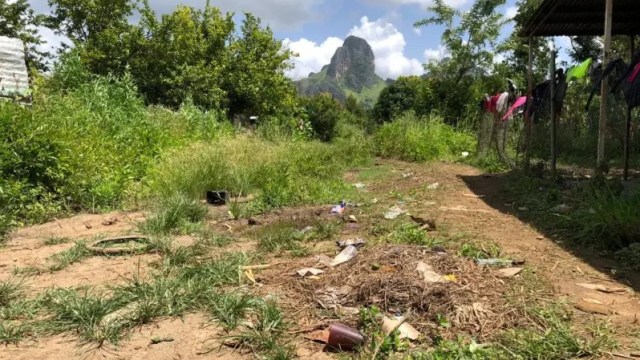
Neglect and hardships drawn on flaccid bodies among swamped land and streets with garbage mixed between bushes. This is one of the many images seen in the community of “Los Mangos” and other nearby streets of the Vista Hermosa sector, in San Juan de los Morros, capital of Guárico State.
By La Patilla – Pedro Izzo
Sep 08, 2022
The “26 de Julio” prison and the former General Penitentiary of Venezuela (PGV), which was evicted on October 28th, 2016, after four weeks of armed conflict, are located a few meters away from this sector.
Today the inhabitants no longer hear the roar of the shootouts: they only have the silence of yesterday and the terrible abandonment in what was considered one of the largest (land) invasions in the country, even in Latin America, as some inhabitants remember it.
“We have been here for 14 years, which we had hoped would get us ahead, little by little, because nothing happens overnight,” said María Eugenia de Reyes.
Rains and Floods
The reporting team of lapatilla.com responded to the call of some inhabitants of Los Mangos, who ask the regional and municipal authorities to help them dredge their streets, which are impassable and full of garbage and weeds. Since the rains came their houses are flooded and the needs suffered by the inhabitants of Vista Hermosa seem not to matter to the regional and municipal authorities, since they do not respond to the calls for help of these Venezuelans.
“I don’t want to leave, because I have nowhere to go. No one is going to buy that “rancho” (improvised shack or home) from me, so I can later go to another community. So, the good that I want for myself I ask for everyone in the community, because we suffer from the same needs: we have lost refrigerators, mattresses, papers, documents, clothes, food, everything as a result of the rains,” lamented María Eugenia.
Heavy rains collapse septic tanks, increasing the risks of contamination and bites by insects, snakes or poisonous animals.
“I got a spider bite on this foot a few months ago, and it came from a septic tank. So imagine this situation for a child, just like the one I experienced, with diarrhea, fever, headache, excruciating pain in the legs. I couldn’t sleep. I was desperate,” said María Eugenia.
Residents of Los Mangos and its surroundings explained that they do not have paved streets and most of the houses are “zinc or wooden shacks.” The basic services they have were installed in a rudimentary way by the inhabitants themselves.
Extreme Poverty
Those who live in the Vista Hermosa sector have a first-row look at the majestic Arístides Rojas Monument, also known as the “Los Morros de San Juan” (San Juan Mounds, a unique geological formation). This masterpiece of nature contrasts with the hardships of an unassisted community in extreme poverty.
“For ten years the government has not wanted to help us. Before, they built streets for us, they filled them in, but now the toilet doesn’t flush and people throw away the garbage or burn it, because what used to be the main street is full of bushes and garbage, you can’t go through it anymore,” explained Ennio Reyes. .
The deterioration shown in the Vista Hermosa sector, in the capital of Guárico, is a faithful reflection of the Venezuelan crisis according to the analysis of Milagros Domínguez, a specialist in Social Work.
“When there are deficiencies in basic matters such as food, education, health, housing and employment, this reflects a decrease in social well-being in the community, fundamentally based on the lack of attention from the corresponding government organisms,” she pointed out.
In 2021, the National Survey of Living Conditions (Encovi) estimated food insecurity in Guárico State at 73%. Meanwhile, the Venezuelan Observatory of Food Security and Nutrition (Ovsan) calculated that only 9% of the Guárico population has enough economic resources to cover the basic food basket, largely thanks to the remittances they receive from relatives abroad.
Forced Migration
A girl and a boy, both thin and barefoot, can be seen running around on a muddy street: “Their parents go out to work and they stay home alone,” one of the neighbors commented.
In other homes in Vista Hermosa, neglect reigns supreme: many of those who lived there, even in brick and mortar houses, emigrated to survive the Complex Humanitarian Emergency (CHE) in Venezuela.
For Domínguez, the forced migration as a result of the CHE also triggers a destabilization of the family. “This is how we observe unsupervised children attending to household obligations, without any parental control, who must go out to look for sustenance or in other cases, older adults left alone,” she explained.
The social worker suggested to the authorities the application of public policies aimed at addressing specific problems in the communities: “Programs with special emphasis on the family, which strengthen the productive capacity of the inhabitants, occupation of the free time of children and youth, with instruments of change that could be music or sports”.
Working Together
When the opposition mayor of the Roscio Municipality, Sulme Ávila, was queried about the problem of Vista Hermosa, she assured that during the electoral campaign they carried out cleaning and rehabilitation of streets with heavy machinery, medical assistance days and the donation of light bulbs for public lighting.
However, Ms. Ávila stressed that the needs of the Vista Hermosa sector require a joint effort by the national, regional and municipal governments.
“It is a community where sewage, white water, electrification, roads and everything that corresponds to sanitation has to be done anew,” she asserted.
Meanwhile, the residents who still remain in Vista Hermosa continue to overcome vicissitudes, clinging to the same hope as 14 years ago.
…
Read More: La Patilla – In Vista Hermosa the roar of the bullets ceased, but its inhabitants are still sunk in misery (Photos)
…

